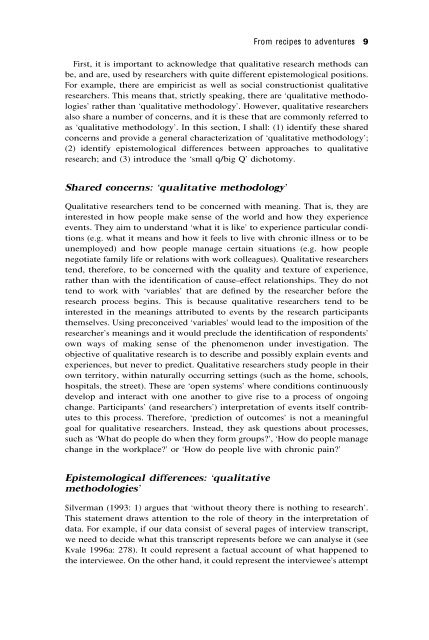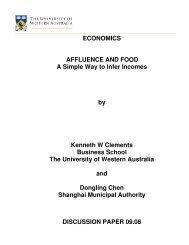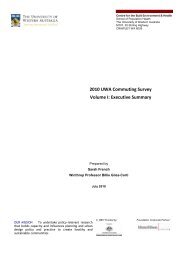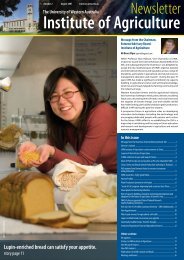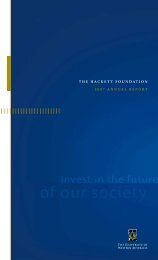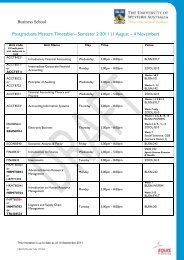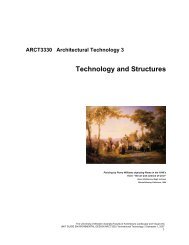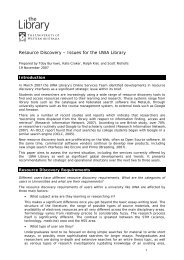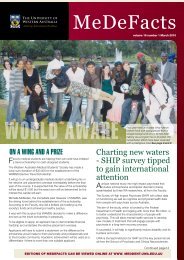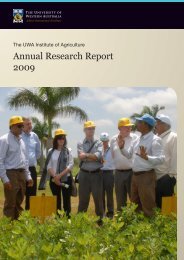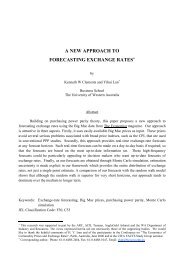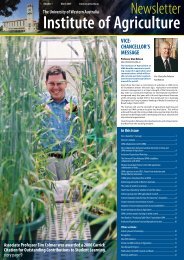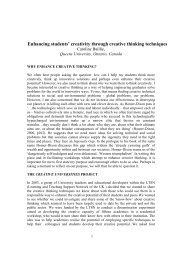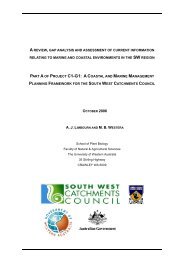Adventures in theory and method
Adventures in theory and method
Adventures in theory and method
Create successful ePaper yourself
Turn your PDF publications into a flip-book with our unique Google optimized e-Paper software.
From recipes to adventures 9First, it is important to acknowledge that qualitative research <strong>method</strong>s canbe, <strong>and</strong> are, used by researchers with quite different epistemological positions.For example, there are empiricist as well as social constructionist qualitativeresearchers. This means that, strictly speak<strong>in</strong>g, there are ‘qualitative <strong>method</strong>ologies’rather than ‘qualitative <strong>method</strong>ology’. However, qualitative researchersalso share a number of concerns, <strong>and</strong> it is these that are commonly referred toas ‘qualitative <strong>method</strong>ology’. In this section, I shall: (1) identify these sharedconcerns <strong>and</strong> provide a general characterization of ‘qualitative <strong>method</strong>ology’;(2) identify epistemological differences between approaches to qualitativeresearch; <strong>and</strong> (3) <strong>in</strong>troduce the ‘small q/big Q’ dichotomy.Shared concerns: ‘qualitative <strong>method</strong>ology’Qualitative researchers tend to be concerned with mean<strong>in</strong>g. That is, they are<strong>in</strong>terested <strong>in</strong> how people make sense of the world <strong>and</strong> how they experienceevents. They aim to underst<strong>and</strong> ‘what it is like’ to experience particular conditions(e.g. what it means <strong>and</strong> how it feels to live with chronic illness or to beunemployed) <strong>and</strong> how people manage certa<strong>in</strong> situations (e.g. how peoplenegotiate family life or relations with work colleagues). Qualitative researcherstend, therefore, to be concerned with the quality <strong>and</strong> texture of experience,rather than with the identification of cause–effect relationships. They do nottend to work with ‘variables’ that are def<strong>in</strong>ed by the researcher before theresearch process beg<strong>in</strong>s. This is because qualitative researchers tend to be<strong>in</strong>terested <strong>in</strong> the mean<strong>in</strong>gs attributed to events by the research participantsthemselves. Us<strong>in</strong>g preconceived ‘variables’ would lead to the imposition of theresearcher’s mean<strong>in</strong>gs <strong>and</strong> it would preclude the identification of respondents’own ways of mak<strong>in</strong>g sense of the phenomenon under <strong>in</strong>vestigation. Theobjective of qualitative research is to describe <strong>and</strong> possibly expla<strong>in</strong> events <strong>and</strong>experiences, but never to predict. Qualitative researchers study people <strong>in</strong> theirown territory, with<strong>in</strong> naturally occurr<strong>in</strong>g sett<strong>in</strong>gs (such as the home, schools,hospitals, the street). These are ‘open systems’ where conditions cont<strong>in</strong>uouslydevelop <strong>and</strong> <strong>in</strong>teract with one another to give rise to a process of ongo<strong>in</strong>gchange. Participants’ (<strong>and</strong> researchers’) <strong>in</strong>terpretation of events itself contributesto this process. Therefore, ‘prediction of outcomes’ is not a mean<strong>in</strong>gfulgoal for qualitative researchers. Instead, they ask questions about processes,such as ‘What do people do when they form groups?’, ‘How do people managechange <strong>in</strong> the workplace?’ or ‘How do people live with chronic pa<strong>in</strong>?’Epistemological differences: ‘qualitative<strong>method</strong>ologies’Silverman (1993: 1) argues that ‘without <strong>theory</strong> there is noth<strong>in</strong>g to research’.This statement draws attention to the role of <strong>theory</strong> <strong>in</strong> the <strong>in</strong>terpretation ofdata. For example, if our data consist of several pages of <strong>in</strong>terview transcript,we need to decide what this transcript represents before we can analyse it (seeKvale 1996a: 278). It could represent a factual account of what happened tothe <strong>in</strong>terviewee. On the other h<strong>and</strong>, it could represent the <strong>in</strong>terviewee’s attempt


